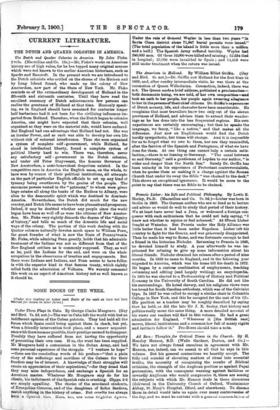Francis Lieber: his Life and Political Philosophy. By Lewis R.
Harley, Ph.D. (Macmillan and Co. 7s. 6d.)—Lieber was born in Berlin in 1800. The German scribes who are so kind as to lecture and advise us would do well to study that period of their history. We at least have never had a Jena, or welcomed a foreign con- queror with such enthusiasm that he could not help saying, "I know not whether to rejoice or feel ashamed." At fifteen Lieber fought at Waterloo. But Prussia under the Holy Alliance was little better than it had been under Napoleon. Lieber left his country to fight for the Greeks, and was grievously disappointed. Then he made his way to Rome, and was fortunate enough to find a friend in the historian Niebuhr. Returning to Prussia in 1828, he devoted himself to study. A year afterwards he was im- prisoned for refusing to give up some information about his liberal friends. Niebuhr obtained his release after a period of nine months. In 1826 he came to England, and in the following year migrated to America, which was his home till his death in 1872. He began by a curious combination of employments, teaching swimming and editing (and largely writing) an encyclopedia. In 1835 be was elected to a Professorship of History and Political Economy in the University of South Carolina He did not like his surroundings. He hated slavery, and his religious views were too broad for South Carolina orthodoxy, which was of the Calvinist type. In 1857 he was called to occupy a similar chair in Columbia College in New York, and this he occupied for the rest of his life. His position as a teacher may be roughly described by saying that he held, as did the late Sir J. R. Seeley, that history and politics really mean the same thing. A more detailed account of his views our readers will find in this volume. He had a great admiration for England. " Wherever it [the British race] moves, liberal institutions and a common law full of manly rights and instincts follow it." Pro-Boers should take a note.






































 Previous page
Previous page